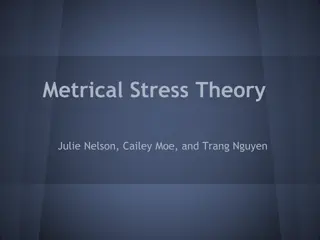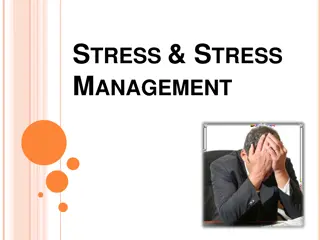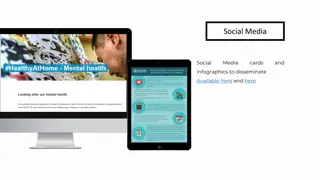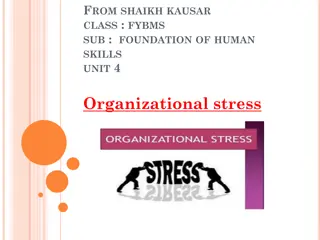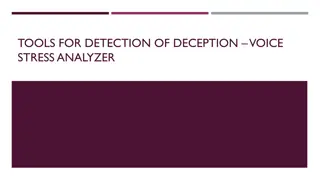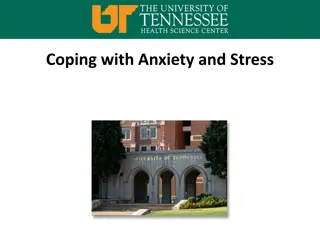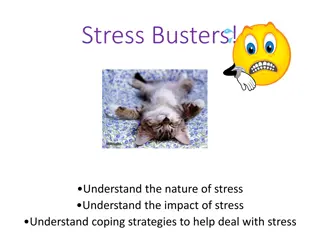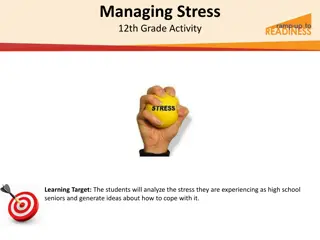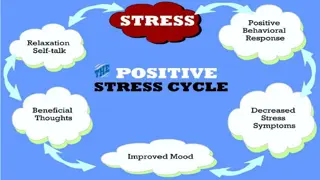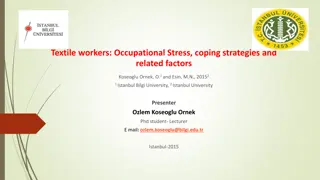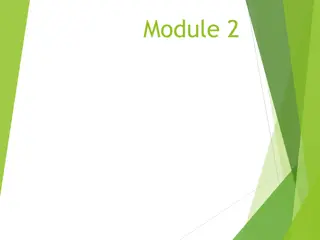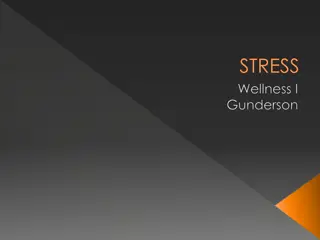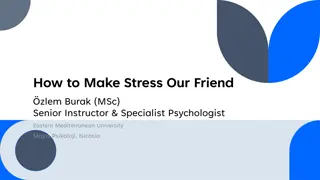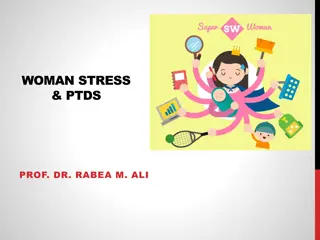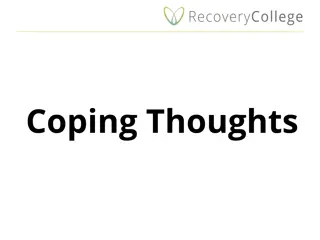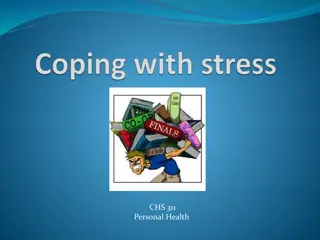Effective Coping Strategies for Stress Management
Avoidance coping is described as a maladaptive way of dealing with stress by avoiding the source of discomfort. In contrast, active coping involves addressing stressors directly through cognitive or behavioral strategies. Avoidance coping can lead to increased stress and conflict in relationships, while active coping is more effective in minimizing stress in the long run. Learn how to shift from avoidance coping to active coping by understanding its pitfalls and implementing proactive stress management techniques.
Download Presentation

Please find below an Image/Link to download the presentation.
The content on the website is provided AS IS for your information and personal use only. It may not be sold, licensed, or shared on other websites without obtaining consent from the author. Download presentation by click this link. If you encounter any issues during the download, it is possible that the publisher has removed the file from their server.
E N D
Presentation Transcript
B.A. PART I (H) 09TH MAY 2020 KUMARI RANJEETA GUEST FACULTY M. L. ARYA COLLEGE, DEPTT. OF PSYCHOLOGY E-mail- bkranjeeta@gmail.com Mb. No.- 8969020842
09 MAY 2020 B.A. PART I (H) PAPER III, UNIT II (STRESS PROBLEM OF ADJUSTMENT) COPYING WITH STRESS: TASK ORIENTED REACTION Avoidance-Oriented coping Avoidance coping, also known as avoidant coping, avoidance behaviors, and escape coping, is a maladaptive form of coping that involves changing our behavior to try to avoid thinking or feeling things that are uncomfortable. In other words, avoidance coping involves trying to avoid stressors rather than dealing with them. The other broad category of coping is "active coping" or "approach coping," which is coping that addresses a problem directly as a way to alleviate stress.
09 MAY 2020 B.A. PART I (H) PAPER III, UNIT II (STRESS PROBLEM OF ADJUSTMENT) This means talking through problems to alleviate relationship stress, reframing a situation to recognize the positives of a situation, or budgeting more carefully to minimize financial stress, for example. Active Coping With active coping, you are addressing the stress, rather than attempting to avoid it. There are two main types of active coping: Active-cognitive coping involves changing how you think about the stressor. Active-behavioral coping addresses the problem directly.
09 MAY 2020 B.A. PART I (H) PAPER III, UNIT II (STRESS PROBLEM OF ADJUSTMENT) There are many ways in which avoidance behaviors magnify stress: They don't actually solve the problem that causes the stress, so they are less effective than more proactive strategies that may minimize stress in the future. Avoidance may allow problems to grow. Avoidance may also be frustrating to others, so habitually using avoidance strategies may create conflict in relationships and minimize social support. Avoidance approaches can create more anxiety much of the time.
09 MAY 2020 B.A. PART I (H) PAPER III, UNIT II (STRESS PROBLEM OF ADJUSTMENT) How to Avoid Avoidance Coping It's far healthier to avoid this type of coping by using active coping strategies. If you've tended toward avoidance coping most of your life, however, or at least are in the habit of using it, it's hard to know how to stop. Here are some effective ways to get out of the avoidance coping habit: Understand what it is and why it doesn't work: Yes, you've already taken an important first step toward cutting down on avoidance coping by reading this article and getting this far. Now that you have a greater understanding of why avoidance coping is self-defeating in most instances, you'll be more able to talk yourself out of it and into more proactive and effective ways of managing stress when you face it.
09 MAY 2020 B.A. PART I (H) PAPER III, UNIT II (STRESS PROBLEM OF ADJUSTMENT) Recognize when you're doing it: Take a minute to think of common times you tend to use avoidance coping. Do you procrastinate? Do you avoid discussing problems or facing issues? Make a note of these times, and make it a point to notice when you avoid things in the future. This is a vital step in stopping yourself and replacing your habits with more effective ones. Use stress relief techniques: Remember, one of the only passive coping strategies found to be helpful is the practice of stress relief techniques. If you learn to calm your body's stress response when you face stress and conflict, you'll be less reactive and more empowered to be proactive. It can also enhance your confidence and belief in your ability to handle the stressors you face. This all makes it easier to let go of your avoidance habits.
09 MAY 2020 B.A. PART I (H) PAPER III, UNIT II (STRESS PROBLEM OF ADJUSTMENT) Practice emotional coping techniques: Journaling and meditation have been found to be highly effective for managing emotional stress.9 In addition to finding techniques that calm your physiology, finding strategies to soothe your emotions can help you to feel less threatened (and in need of escape) when stressed and more able to face stress head-on. Learn to tolerate uncomfortable feelings (meditation helps!): Once you become more used to being uncomfortable, you'll be more comfortable with the feelings you usually run from. This can help immeasurably because you'll have more of a choice in how you face problems; you won't have a knee-jerk avoidance response, and facing problems head-on won't bring as much anxiety once you're more used to it.
09 MAY 2020 B.A. PART I (H) PAPER III, UNIT II (STRESS PROBLEM OF ADJUSTMENT) One way to become more comfortable with the uncomfortable is to practice meditation. Identify active coping options: The next time you face a stressor, look at your options. Is there a way you can reframe your thoughts to identify resources you didn't realize you had, recognize hidden benefits in a situation that you didn't initially see, or approach it from a mental standpoint that doesn't involve avoidance? Are there strategies you can actively take that involve doing something differently to positively affect your situation? Think about what you can do to improve your situation, and then do it.
09 MAY 2020 B.A. PART I (H) PAPER III, UNIT II (STRESS PROBLEM OF ADJUSTMENT) Practice communication skills: If you tend to run from conflict, it may be because you don't know how to resolve a conflict in a proactive or peaceful way.10 (Many people weren't taught assertiveness skills growing up, but it's never too late to learn!) Become comfortable discussing issues and coming up with "win-win" solutions whenever possible, and you'll find yourself less tempted to avoid conflict and more empowered to resolve it in a way that strengthens your relationships. Take small steps: Sometimes the idea of tackling a stressful situation feels insurmountable, but taking the first step in that direction might feel far more doable. See if you can change your behaviour by trying out a small step in the direction of being active in your coping. Then take a larger step next time. Soon, you'll be more comfortable on a more active path.
09 MAY 2020 B.A. PART I (H) PAPER III, UNIT II (STRESS PROBLEM OF ADJUSTMENT) Have someone hold you accountable: It's much harder to run from your problems when you have someone you have to explain this to. Use this reality to your advantage and enlist a buddy in your efforts to stamp out avoidance coping. Have someone ask you if you've started that project yet, or talked to the person you're angry with, or stopped obsessing and taken action. Sometimes you just need a nudge in the right direction from someone outside yourself. Sometimes you just need some extra support. Find help: Speaking of extra support, you can always speak to a therapist about avoidance tendencies, particularly if it's affecting your life in negative ways or you feel unable to tackle the problem on your own to the extent that you'd like.11 With a little support, you can become more active in your coping strategies and less stressed with relative ease.







